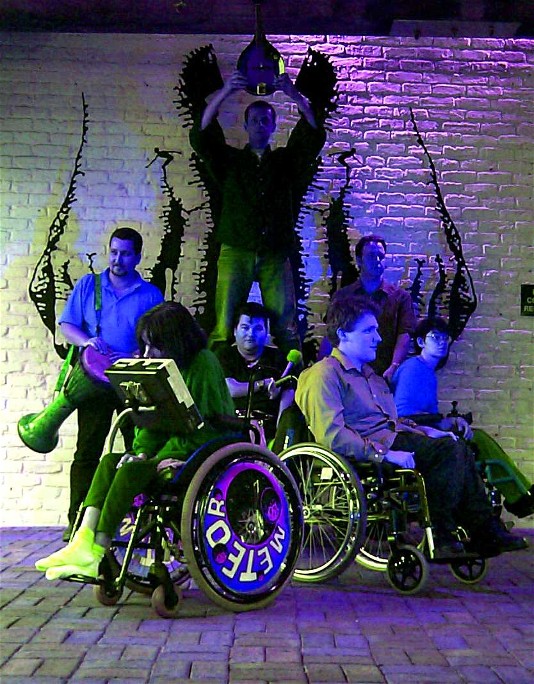I guess this is partly my specialist area. I have learnt and worked around disability for almost 20 years now. My work has focused primarily in informal and social or community education and over the years emerged into an understanding of inclusion. My perspective and influences come from other disabled people and a shared, collective experience.
I have another part of the site to explore inclusion and another to explore training and facilitation, so here, I'm going to stay focused on issues of Disability Equality. For now I'm going to keep this focus under the following headings:
Eventually you will also be able to read my various papers on aspects of disability and education. There will also be learning material for those interested in disability issues and equality. Please be patient, as my aim is to develop this page content over a period of time. I'm currently completing a degree in education so that is my priority till the middle of May. I will just keep chipping away and this section will always be alive as new material and understanding develops.
Dignity
We learn, when we respect the dignity
of the people, that they cannot be denied the elementary right to participate
fully in the solutions to their own problems. Self-respect arises only out of
people who play an active role in solving their own crises and who are not helpless,
passive puppet-like recipients of private or public services. To give people
help, while denying them a significant part of the action, contributes nothing
to the development of the individual. In the deepest sense, it is not giving
but taking - their dignity. Denial of opportunity for participation is the denial
of human dignity and democracy. It will not work.
Quotes from " Rules for radicals" by Saul D. Alinsky,
1971, Vintage Books, a division of Random House/New York, 1972
The Importance of Our Culture &
Arts

“When it comes to disability, most of us had no examples
to follow. There wasn’t anything in our cultural background to tell us
how to react,
how to deal with things that happened. Others had passed this way before, but
they had left no footprints in the sand, nothing for us to follow.
This is why the arts are potentially so important within disability culture.
They can give disabled people a sense of their own identity,
an understanding of something larger, something that has existed through history.
So I see it as a major responsibility for us to leave something behind, so that
those who come after will know they are not alone”
Alian Sutherland, Nat. Disability Arts Forum. Feb99.
Goodbye & Thanks Disabilty Rights Commision & Hello The Equality & Human Rights Commission.
I read this interview in my NDAF newsletter (see
rockinmended) with Sir Bert Massie and felt it important o share as I think
it’s an important part of our history & story.

"When we set up the DRC seven and a half years ago, expectations were high. In our short life we have, I believe, been ground-breaking and lived up to those early high expectations.
Within two years of opening, we had built a strong case and consulted on proposals for strengthening the Disability Discrimination Act (DDA). The fruit of this was the DDA 2005. We have taken landmark cases to the higher courts, which clarified and improved the law through precedent-setting judgements. The law now has teeth and we have used it to help many individuals. But we have also increasingly looked to supplement individual litigation and conciliation with rooting out systemic discrimination.
We have done this through our formal investigations: into website inaccessibility, the fact that people with learning disabilities and mental health problems become ill and die younger than others, and the unnecessary and intrusive regulation of the health or fitness of teachers, social workers and nurses. We campaigned for, won and promoted the disability equality duty, as a crucial new tool to transform public policy and public services.
We have also tried to change the way that disability is debated in Britain. Disability is not just a worthy topic of passing human interest but newsworthy and relevant to the big debates of the age. We have tried to encourage people to see that equality for disabled people and their families means a stronger society and economy for everyone. Perhaps the strongest expression of our case, that equality for disabled people is at the heart of what is needed to create a successful Britain, is contained within our Disability Agenda launched earlier this year.(...)
Our time to take this agenda forward has ended. And the future of disability equality is now within the Equality and Human Rights Commission, where I will be a commissioner and my fellow DRC and EHRC commissioner Jane Campbell will chair the Disability Committee.
Just as there were for the DRC, so too there are very high expectations of the new commission - to change thinking and behaviour and to become the trusted expert and world leader on disability (as we have been) and on many other issues. I leave the EHRC with this challenge and with a word of advice. We achieved all that we did because we walked in the company of friends. Friends that we listened to, learned from and worked with. Friends who supported us in taking on the challenges. Friends who demanded of us nothing less than the highest ambitions and standards. Critical friends who told us when we were wrong or could do better.
Thank you, friends of the DRC, for that support. We hope the we have lived up to at least some of your expectations. I look forward to working with you in a very different era for equality. And I finish with a request. Give your support to the EHRC. Give it your knowledge, your ideas and your energy, as you always gave them to us. But also demand of it the same high standards as you always, quite rightly, expected of us.
Thank you.
Sir Bert Massie CBE
Celebrating The Journey is a commemorative website and includes a final report marking the end of the DRC, see rockinmended.